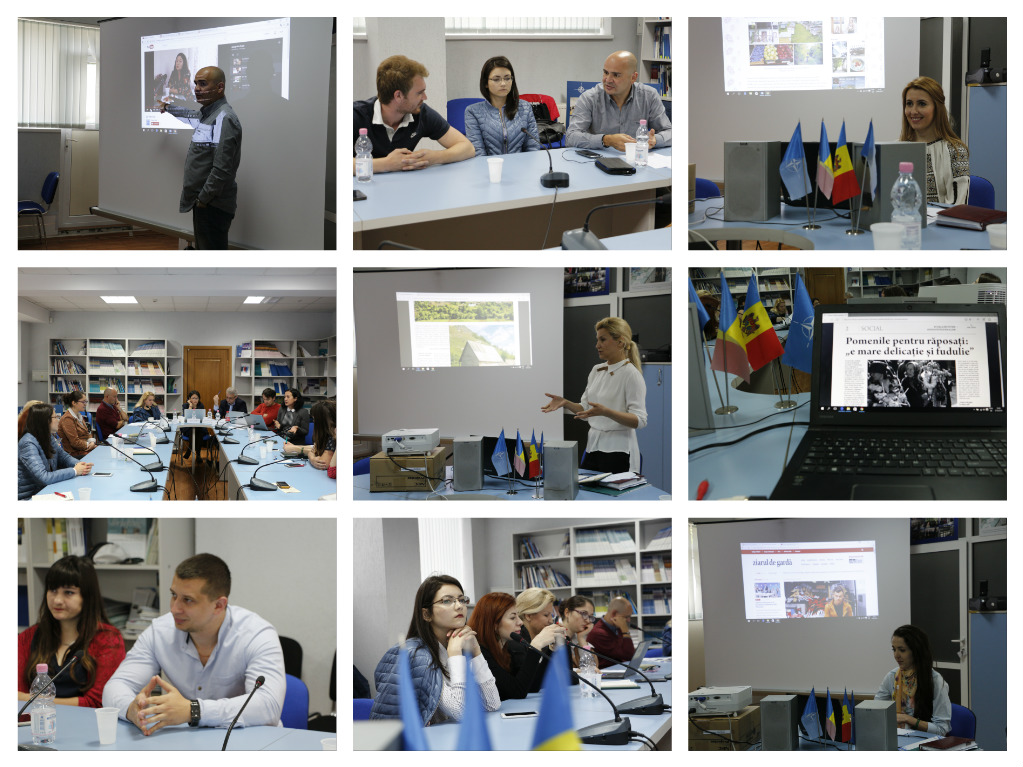Public presentation of final works, a challenge successfully passed by SAJ students

A difficult, interesting work, with lots of challenges and emotions. These words characterize the three weeks when the students of the School of Advanced Journalism prepared their final projects. On May 26 and 27, the works were presented before a commission of media experts. Of the 14 students, four produced TV reports, five tried their powers online, four chose the newspaper, and one student made a radio report.
The topics chosen for final works were diverse, but they all focused on social themes. Iurii Botnarenco informed us about new provisions of the anti-tobacco law and told us about the places where people won’t be able to smoke after May 31 and what punishments await those who will not abide by the rules. Stela Boico spoke with several young mothers and found out what they do and what they are passionate for besides taking care of their children. Ecaterina Mihalachi told us the stories of some Moldovans who managed to develop successful businesses in Moldova after working for years abroad. From her we found out in what Moldovan village they make the tastiest Italian pastry, “canoncini,” and where you can buy microfiltered water. Petru Garciu teleported us to Gagauzia and revealed the secrets of Gagauz people. From him, we learned how they make the tastiest traditional pie, “cavarma,” what a “ciotra” is, and how traditional Gagauz carpets are woven.
Student Lia Ciutac spoke about rural tourism, which stimulates the development of local businesses. Liliana Croitor explained the meaning of traditional Moldovan carpets. Veronica Tabureanu made a journalistic investigation about the landfill at the outskirts of the town of Cantemir, which pollutes wells in the area and is a real danger for residents. Elena Furdui tried to find out if other ethnic groups and religious confessions that live in our country have the tradition of gifts in the memory of deceased relatives. Tatiana Lujanskaya reminded us about the carcinogenic danger of slate. Anastasia Pojoga found out why children with disabilities are disliked by drivers. And Olimpia Begleta wrote an article about how disability can be transformed into ability.
The most interesting and intriguing final projects were produced by students Irina Gusan, Natalia Ghetu, and Svetlana Parfeni. Irina spoke about the villagers who refuse to work; Natalia discovered fakes that are worn on Victory day; and Svetlana told us about employment opportunities for the blind.
The commission found that all works more or less met journalistic requirements. They were assessed by taking into consideration such criteria as timeliness, accuracy, objectivity, originality, fairness, lack of bias, and impartiality.
SAJ students were pleased with results. For many of them, the final project was a very useful experience that will help them in their future work. Veronica Tabureanu said that the final work was for her a real life lesson: “I saw again that journalism demands much patience and work.”
For Olimpia Begleta the final work was “the culmination of studies at the SAJ.” “I am grateful to trainers for having helped me gain knowledge throughout the year,” she said. Elena Furdui confessed that although the work was difficult, it was very interesting and pleasant. “If I were to choose again where to study, I’d return to the School of Advanced Journalism,” she said.
Iurii Botnarenco, who acted as reporter and cameraman for his report, and also did sound recording and editing, is proud of his work. He is sure that the experience of these three weeks, as well as what he heard from the commission, will help him a lot in the future. “I accepted the challenge and succeeded,” he concluded.
The School of Advanced Journalism is a project of the Independent Journalism Center in Chisinau in partnership with the Missouri School of Journalism, USA, and the Center for Training and Improvement of Journalists in Paris, France. The SAJ was launched on September 4, 2006, with the purpose of preparing universal journalists for Moldovan mass media. Currently, the SAJ is holding the second phase of admission. Details about admission procedure and criteria can be found here.
